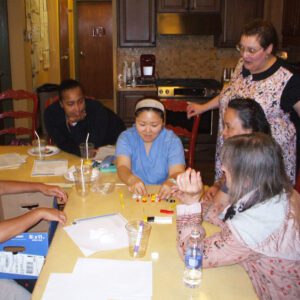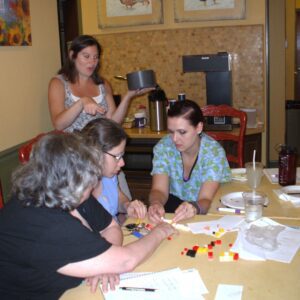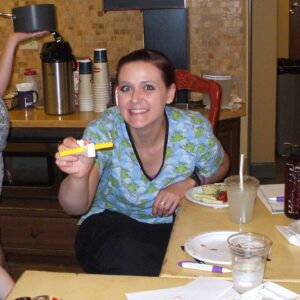
Debra, RN, with some of our nurses, facilitating a team-building exercise that measures attention to detail.
Debra, RN, spends quite a bit of her time—inside and outside of the office—brainstorming ideas about how to make documentation relevant and engaging.
Quality Assurance Manager for Independence Plus, Debra can be overheard saying, “If it wasn’t documented, it didn’t happen.” Debra’s words ring true. Documentation is increasingly important to protect clinicians, patients, and patients’ insurance coverage—not to mention, continuity of care! We all need to check the nursing care provided to our patients, even if we are simply wondering if a medication was given or if a bowel program had successful results. When an incident occurs or a patient’s insurance coverage requires re-authorization, nursing documentation is all the more critical.
“Understanding the ‘why’ behind documentation is the first step,” Debra explains. Debra believes nurses are more likely to produce high quality and thorough nursing notes when they understand how documentation is used and its importance.
The second step is learning how to communicate throughout nursing notes to provide a complete picture of the care provided to the patient. While this skill comes naturally to some, anyone can learn how to document appropriately. In an effort to prove this, Debra and her team recently gave a well-attended presentation to a group of nurses called, “The ABCs of Documentation.”
Documentation Game
To demonstrate appropriate documentation, Debra broke the nurses up into two teams and handed each team a box and a Ziploc bag. Inside the box was a completed Lego structure. One group received a skyscraper and the other, an airplane. Inside the Ziploc bag were individual Legos that, if assembled correctly, could recreate the completed Lego structure (i.e. skyscraper, airplane).
The team captain was the only person who could see the completed structure. The captain’s job was to verbalize to the group how to assemble the individual pieces to create the completed structure.
Ashley, BSN, RN, who was in attendance, says, “The more detailed the nurses’ descriptions, the easier it was to put the puzzle together.”
Ashley’s words are exactly what Debra was hoping for!
Debra explained, “The thought behind the game is that your words (written or spoken) are the only method you have to explain the treatment and care provided to the patient to someone who is not present. Whether it’s me, as QA Manager, reading your nursing notes or a Supervising Nurse helping you in an emergency situation.”
When nurses document and pay attention to the details, the complete picture is more easily understood by all, and together, we provide better patient care.
This simple, fun game is a great way to test attention to detail and communication skills. Please feel free to try the game or share it with your colleagues.


